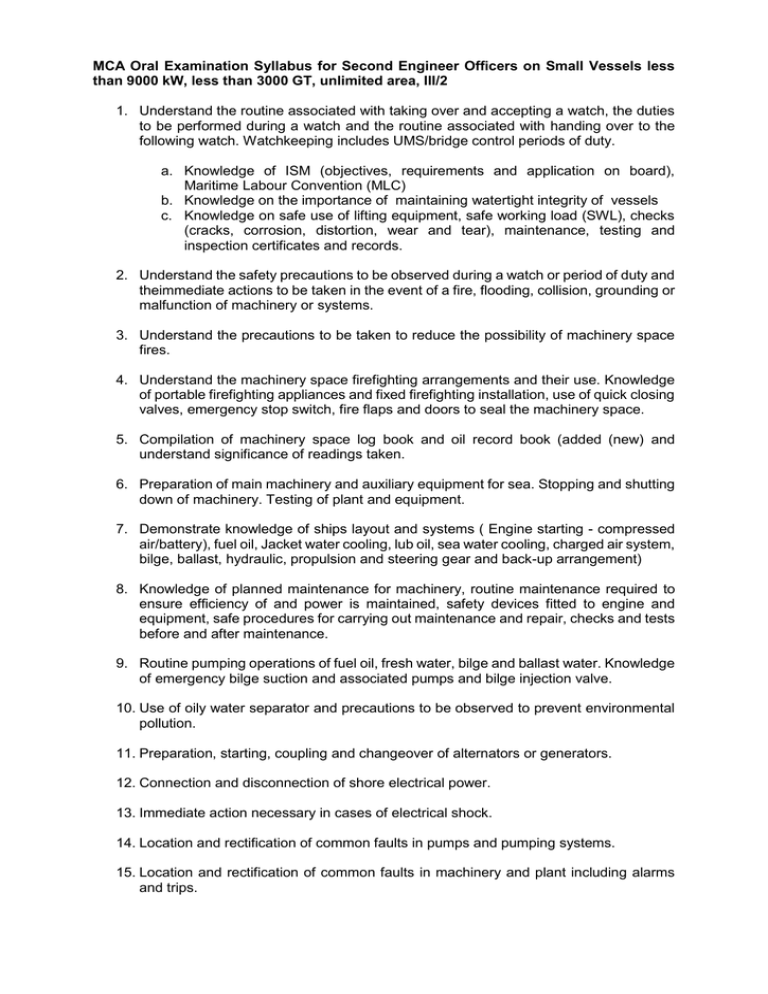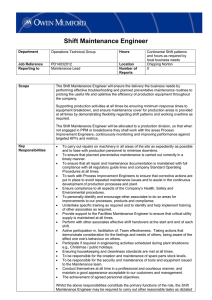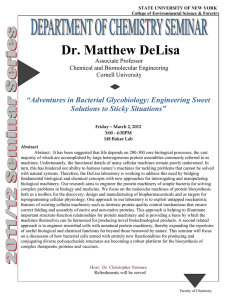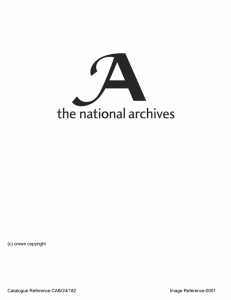Small Vessel (SV) Engineer
advertisement

MCA Oral Examination Syllabus for Second Engineer Officers on Small Vessels less than 9000 kW, less than 3000 GT, unlimited area, III/2 1. Understand the routine associated with taking over and accepting a watch, the duties to be performed during a watch and the routine associated with handing over to the following watch. Watchkeeping includes UMS/bridge control periods of duty. a. Knowledge of ISM (objectives, requirements and application on board), Maritime Labour Convention (MLC) b. Knowledge on the importance of maintaining watertight integrity of vessels c. Knowledge on safe use of lifting equipment, safe working load (SWL), checks (cracks, corrosion, distortion, wear and tear), maintenance, testing and inspection certificates and records. 2. Understand the safety precautions to be observed during a watch or period of duty and theimmediate actions to be taken in the event of a fire, flooding, collision, grounding or malfunction of machinery or systems. 3. Understand the precautions to be taken to reduce the possibility of machinery space fires. 4. Understand the machinery space firefighting arrangements and their use. Knowledge of portable firefighting appliances and fixed firefighting installation, use of quick closing valves, emergency stop switch, fire flaps and doors to seal the machinery space. 5. Compilation of machinery space log book and oil record book (added (new) and understand significance of readings taken. 6. Preparation of main machinery and auxiliary equipment for sea. Stopping and shutting down of machinery. Testing of plant and equipment. 7. Demonstrate knowledge of ships layout and systems ( Engine starting - compressed air/battery), fuel oil, Jacket water cooling, lub oil, sea water cooling, charged air system, bilge, ballast, hydraulic, propulsion and steering gear and back-up arrangement) 8. Knowledge of planned maintenance for machinery, routine maintenance required to ensure efficiency of and power is maintained, safety devices fitted to engine and equipment, safe procedures for carrying out maintenance and repair, checks and tests before and after maintenance. 9. Routine pumping operations of fuel oil, fresh water, bilge and ballast water. Knowledge of emergency bilge suction and associated pumps and bilge injection valve. 10. Use of oily water separator and precautions to be observed to prevent environmental pollution. 11. Preparation, starting, coupling and changeover of alternators or generators. 12. Connection and disconnection of shore electrical power. 13. Immediate action necessary in cases of electrical shock. 14. Location and rectification of common faults in pumps and pumping systems. 15. Location and rectification of common faults in machinery and plant including alarms and trips. 16. Demonstrate Knowledge and impact of MARPOL Annexes I, IV, V, and VI and awareness of MARPOL Annexes II & III. 17. Knowledge of preparations, procedures, checks and pollution prevention measures concerning bunkering operation (s). 18. Knowledge of enclosed spaces, associated hazards, entry procedures and permit to work. 19. Sewage plant operation and potential health risks. 20. Basic knowledge of COSHH (control of substances hazardous to health) 21. Basic knowledge of volts, ampere, hertz and kilowatts, switchboard instrumentation, reverse current protection, earth monitoring systems, preferential trips, breakers, fuses and isolating switches. 22. Understand safety precautions applying to maintenance of electrical appliances and equipment. 23. Knowledge on refrigeration system and functions of system components (equipment) and checks during operation. 24. Knowledge on hydraulic system and safety precautions. 25. Knowledge of different storage batteries for marine use MCA Oral Examination Syllabus for Chief Engineer Officer, less than 3000 kW, less than 500 GT, unlimited area, STCW Reg III/3 1. Understand the reason for determining voyage needs; fuel, lubricants, water, stores, expendables. 2. Understand the necessity for routine maintenance and the reasons for maintaining records of machinery and its performance. 3. Understand the consequences of sailing with certain items of machinery inoperative and the risksinvolved in doing so. 4. Understand the (Chief Engineer’s) responsibilities and duties concerning bunkering or refuelling operations. 5. The methods of dealing with fire on board ship. Prevention of the spread of fire. The organisation and direction of fire-fighting and lifesaving parties. 6. Care and management of steering systems and bow thrusters. 7. Care and management of pumping systems. 8. Care and management of oily water separator equipment. 9. (a) Construction, maintenance and operation of fire-fighting equipment (b) Fire detection and prevention. 10. (a) Codes of safe working practices, risk assessment, permit to work (entry into enclosed space, hot work, electrical work) (b) The dangers of entering enclosed spaces. 11. Routine operational duties and the effect of legislation on engine room operations. 12. Working principles and constructional details of marine engines, gears, clutches and ancillary equipment. 13. Fuel oil, lubrication oil, and cooling systems of marine engines together with ancillary systems including filters, pumps, heat exchangers and controls. 14. (a) Methods of manoeuvring, including bridge control systems, variable pitch propellers and bow thrusters. (b) Emergency controls. 15. Working principles and constructional details of air compressors, air receivers and associated equipment. 16. Operational testing and fault rectification of basic control systems and alarm panels. 17. Safe and efficient operation and maintenance of marine engines and propulsion systems. 18. Knowledge of MARPOL Annexes and implementations. 19. Principles of stability, water tight and watertight integrity, free surface effect and reserve buoyancy. 20. Basic understanding of ISM. MCA Oral Examination Syllabus for Chief Engineer Officer, less than 9,000 kW, less than 3,000 GT, unlimited area, STCW Reg III/3 In addition to the above limited chief engineer (less than 500 GT and less than 3000 kW) syllabus. 1. Principles and constructional details of sensing, monitoring and measuring devices associated with marine equipment. 2. Principles involved with the operation, testing and maintenance of propulsive transmission systems, including thrust and shaft bearings, stern tubes and propellers. 3. Principles involved with the operation, testing and maintenance of bilge and ballast pumps, pumping and priming systems including pollution prevention equipment and systems. 4. Principles involved with the operation, testing and maintenance of steering and stabilizing systems including bow thrusters. 5. Principles involved with operation, testing and maintenance of control and alarm systems associated with automatic operation of marine steam plant. 6. Principles involved with the operation, testing and maintenance of: a. b. c. d. e. f. g. marine diesel engines (medium and high speed ); gearing systems and clutches; starting and reversing systems; cooling and lubrication systems; fuel oil preparation systems; air compressors, receivers and associated equipment; auxiliary diesel engines and associated equipment; control and alarm systems associated with automatic operation of a diesel plant. 7. Methods of assessment of power output and diesel plant efficiency and action to be taken to maintain safe and efficient operation of plant. 8. Methods of testing fuel oil, lubrication oil and cooling water and action to be taken to maintain safe conditions. 9. Codes of Safe Working Practices as published and amended. Risk assessment, permit to work (entry into enclosed space, hot work, electrical work). 10. Types of information issued by the MCA with respect to safety at sea. 11. Responsibilities of a chief engineer officer with regard to the control and prevention of fire: a. b. c. a. d. precautions against fire or explosions, explosive mixtures and sources of ignition; principles and methods of fire prevention, detection and extinction in all areas of a ship; principles of the operation, testing and maintenance of fire detection and extinguishing systems; principles of the operation, testing and maintenance of fire pumps and associated pumping b. systems; e. control and organization of fire and damage control parties. 12. Knowledge and understanding of applications and maintenance of ISM codes and system. 13. Organisation and control procedures necessary for the safe and efficient operation in the UMS mode. 14. Principles of the operation, testing and maintenance of: a. alternators, generators, motors, switch gear and batteries; b. ac and dc distribution systems. 15. Fault finding and rectification of faults in electrical systems. 16. Administration duties of a chief engineer associated with: a. organisation and training of staff for normal and emergency duties; b. organisation of temporary and permanent repairs and surveys – Company approval and Classification society. 17. Ensuring ship is in seaworthy condition prior to sailing taking into account nature of voyage. 18. Dry docking, hull surveys and repairs.


